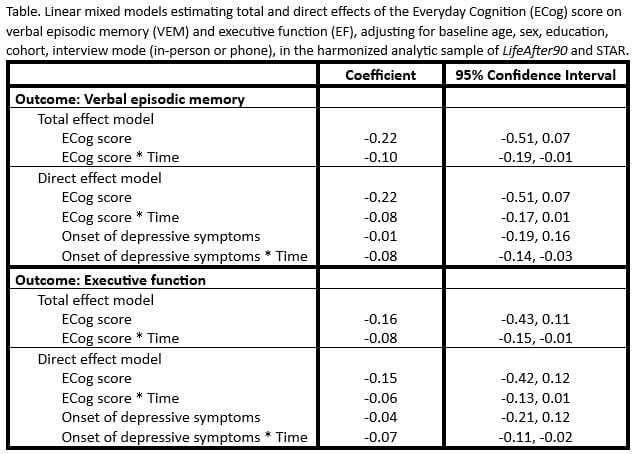Aging
The mediating effects of depressive symptoms in the association between subjective and objective cognitive decline: Findings from LifeAfter90 and STAR Nancy X Chen* Nancy Chen Kristen George Paola Gilsanz Sarah Tomaszewski Farias Rachel Peterson Maria Corrada Rachel A Whitmer
We investigated whether depression mediates the association between subjective and objective cognitive decline in ethno-racially diverse older adults.
LifeAfter90 (LA90) and Study of Health Aging in African Americans (STAR) are ongoing cohort studies of cognitive aging in participants aged 90+ (LA90) and 50+ (STAR). Verbal episodic memory (VEM) and executive function (EF) were assessed using the Spanish and English Neuropsychological Assessment Scales (SENAS) every 6 months (up to 8 times) for LA90 and 16 months (up to 3 times) for STAR. Subjective cognitive decline was measured using the Everyday Cognition (ECog), with responses (1=“Better or no change” to 4=“Consistently much worse”) averaged across 12 items. Depression was assessed by the 8-item Adult PROMIS Depression short form. The sample included participants without baseline depression. Participants were defined as having onset depression if symptoms developed at a later visit or as never having depression if they did not. Linear mixed models with random intercepts and slopes estimated total and direct effects of ECog on VEM and EF at baseline and over time, adjusting for baseline age, sex, race/ethnicity, education, cohort, interview mode (in-person/phone), and depression (direct effect models only).
Participants’ (n=475) baseline mean age was 83±13 years, 65% women, 16% Asian, 53% Black, 8% Latino, 18% White, and 32% had onset depression. For the total effect, greater ECog was associated with faster decline in VEM and EF (bTE-VEM=-0.10, 95%CI -0.19,-0.01; bTE-EF=-0.08, 95%CI -0.15,-0.01). Models of the direct effects showed attenuation of the associations between ECog and cognitive decline (bDE-VEM=-0.08, 95%CI -0.17,0.01; bTE-EF=-0.06, 95%CI -0.13,0.01).
Adults with greater (worse) ECog had faster decline in VEM and EF. However, the attenuation of these effects in the direct effect models suggests that onset of depression partially mediates the relationship between subjective and objective cognitive decline.

